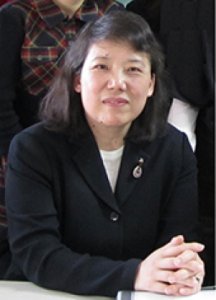Presented By: Nam Center for Korean Studies
Nam Center for Korean Studies Colloquium Series
Planning Assessment in a Proficiency Oriented Foreign Language Program: A Backward Design

Speaker: Sahie Kang, Dean of School of Resident Education in the Directorate of Continuing Education
Assessment is a critical component of curriculum design. Yet, educators often put the priority on the curriculum first, and then set the assessment standards after the main elements of curriculum are established. However, in order to reach the clear learning outcomes at the end of a course, setting standards for the assessment should lead any curriculum development. This is what “Backward Design” has been emphasizing for the last decade.
Backward Design is a process that focuses on assessment first and instructional activities last. It shifts teacher perspectives. Traditional curriculum design often begins with really interesting materials or activities we want to teach or are required to cover. We then design a curriculum, often on the go and then decide on some type of assessment at the end. Backward Design forces teachers to look at the big picture with the end goals in mind. In backward planning teachers set the vision or the essential understanding of their curriculum or unit, decide how students will provide evidence of their learning, and finally design instructional activities to help students learn what is needed to be successful.
Sahie Kang is currently the Dean of School of Resident Education in the Directorate of Continuing Education. She holds a PhD in Linguistics from the University of Florida. She has worked in the field of Language and Linguistics for over 30 years and has been at DLI for 22 years. Prior to the current position, she served as Dean in two different schools at the Presidio: Asian School II (2007-2009) and Middle East School II (2002-2007). She has performed various missions at DLI including Teaching Korean, Curriculum and Test Development, Program Management as a Korean Department Chairperson, OPI Master Tester, Project Manager of Advanced North Korean Dialect Materials Development, DLPT and Curriculum Reviewer and Language Resource Expert for DLPT5 Standard Setting. While being a member of the Korean faculty, she was recognized as an Instructor of the Year in Asian School II in 1993. Dr. Kang has received several official commendations and awards for her work at DLI and received a National Order of Cultural Merit from the Korean government in 2010. She has also taught Linguistics and Korean in different universities in Korea and the US before working at DLI.
With her research interests in socio-linguistics and language and culture education, she has given numerous presentations and published articles dealing with them. To name a few, she authored “The Effect of Study Abroad Program on Socio Linguistic Acquisition,” in Studies in Korean Linguistics and Language Pedagogy 2013; co-authored, with Y. Cho et al., National Standards for Foreign Language Learning in the 21st Century, in 2010; co-authored, with J. Shannon, “Implementing and Assessing Portfolio Projects,” in TESOL 2008 PAIS (Program Administration Interest Section); co-authored, with P. Boylan, “Syllabus Design for the Less Commonly Taught Languages,” in Korean Language in America 1996.
Assessment is a critical component of curriculum design. Yet, educators often put the priority on the curriculum first, and then set the assessment standards after the main elements of curriculum are established. However, in order to reach the clear learning outcomes at the end of a course, setting standards for the assessment should lead any curriculum development. This is what “Backward Design” has been emphasizing for the last decade.
Backward Design is a process that focuses on assessment first and instructional activities last. It shifts teacher perspectives. Traditional curriculum design often begins with really interesting materials or activities we want to teach or are required to cover. We then design a curriculum, often on the go and then decide on some type of assessment at the end. Backward Design forces teachers to look at the big picture with the end goals in mind. In backward planning teachers set the vision or the essential understanding of their curriculum or unit, decide how students will provide evidence of their learning, and finally design instructional activities to help students learn what is needed to be successful.
Sahie Kang is currently the Dean of School of Resident Education in the Directorate of Continuing Education. She holds a PhD in Linguistics from the University of Florida. She has worked in the field of Language and Linguistics for over 30 years and has been at DLI for 22 years. Prior to the current position, she served as Dean in two different schools at the Presidio: Asian School II (2007-2009) and Middle East School II (2002-2007). She has performed various missions at DLI including Teaching Korean, Curriculum and Test Development, Program Management as a Korean Department Chairperson, OPI Master Tester, Project Manager of Advanced North Korean Dialect Materials Development, DLPT and Curriculum Reviewer and Language Resource Expert for DLPT5 Standard Setting. While being a member of the Korean faculty, she was recognized as an Instructor of the Year in Asian School II in 1993. Dr. Kang has received several official commendations and awards for her work at DLI and received a National Order of Cultural Merit from the Korean government in 2010. She has also taught Linguistics and Korean in different universities in Korea and the US before working at DLI.
With her research interests in socio-linguistics and language and culture education, she has given numerous presentations and published articles dealing with them. To name a few, she authored “The Effect of Study Abroad Program on Socio Linguistic Acquisition,” in Studies in Korean Linguistics and Language Pedagogy 2013; co-authored, with Y. Cho et al., National Standards for Foreign Language Learning in the 21st Century, in 2010; co-authored, with J. Shannon, “Implementing and Assessing Portfolio Projects,” in TESOL 2008 PAIS (Program Administration Interest Section); co-authored, with P. Boylan, “Syllabus Design for the Less Commonly Taught Languages,” in Korean Language in America 1996.